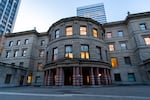
Portland City Hall, Nov. 15, 2024.
Kristyna Wentz-Graff / OPB
While most Portland voters say they understood how to navigate the new ranked-choice voting system last month, people in areas where elections officials had hoped to boost voter education felt less informed than others, according to a new voter exit poll commissioned by the city.
FM3 Research surveyed 1,658 voters after they cast their ballots. According to the results, more voters in East Portland’s District 1 said they didn’t understand the electoral changes than voters in the city’s three other districts. Voters of color were also more likely to express confusion about the ballot changes than white voters, per the poll.
The survey follows a historic overhaul to Portland’s city government and voting systems, approved by voters in 2022. That decision increased the size of Portland City Council, created geographic voting districts, added a city administrator position, and established ranked choice voting, among other things. While most changes go into effect next year, November saw the city’s first ranked choice voting election.
The FM3 poll focused narrowly on how Portlanders felt about the new form of voting. In all, 91% of those polled said they understood how to fill out the city ballot, which featured two types of ranked choice voting: one for Portland mayor and another for city councilors.
Voters were less confident in the specific type of voting in City Council races; Portlanders used a single ballot to elect three district councilors all at once. According to the poll, 22% of surveyed voters said they did not understand this process. In District 1, which includes nearly all of Portland neighborhoods east of I-205, 37% of voters said they didn’t understand the council voting process. That’s at least 10% higher than the rate of misunderstanding in each of the city’s other three districts.
Citywide, voters of color reported feeling more confused with the new voting system, according to the survey. While 6% of white voters polled said they didn’t understand how to fill out their ranked choice ballot, 12% of all voters of color did not understand.
Voters in District 1 were also more unclear about how the city counted ranked choice ballots and expressed less trust that their vote would count than those in other districts. Nearly 50% of District 1 voters polled said they believed that ranking more than one counselor would dilute their vote, which is inaccurate. In comparison, 32% of voters citywide shared this concern.
District 1 is the city’s most racially and ethnically diverse, and its residents have lower average incomes than those in the city’s other districts. The area has long been underrepresented in City Hall under the outgoing form of government, in which city leaders have been elected citywide, not by geographic district. In Portland’s history, only two members of the City Council have lived in this area.
“East Portland has always gotten the short end of the stick, they’re told things are going to happen and then they don’t,” Jose Gamero-Georgeson, a member of the David Douglas School Board, said in a November interview with OPB.
This sense of being left out of the process has contributed to a history of low voter turnout. Only 55% of registered voters in this district cast votes in the 2020 presidential election. This election, 56% of registered voters in the district voted in the presidential race. According to the city’s elections office, of the District 1 voters who participated in the November election, only 43% voted in the City Council race. (In other districts council race participation ranged from 64% to 66%).
The city tried to avoid this pattern this election by investing in new forms of “culturally-specific” voter education and outreach with different community organizations. According to the poll, 65% of District 1 residents said they felt like the city provided clear information about the new voting system. On average, 70% of all Portland voters polled felt like the city had done enough to inform them.
Yet city officials remain optimistic about the poll’s results, which shows that the majority of Portland voters understood the city’s first foray into ranked choice voting.
“Broadly, Portland voters report an understanding of ranked-choice voting according to this poll, an encouraging start for an historic electoral reform,” said Deborah Scroggin, who manages the city’s elections division.
Elections staff plan to present a more detailed report at a Dec. 18 council meeting.
